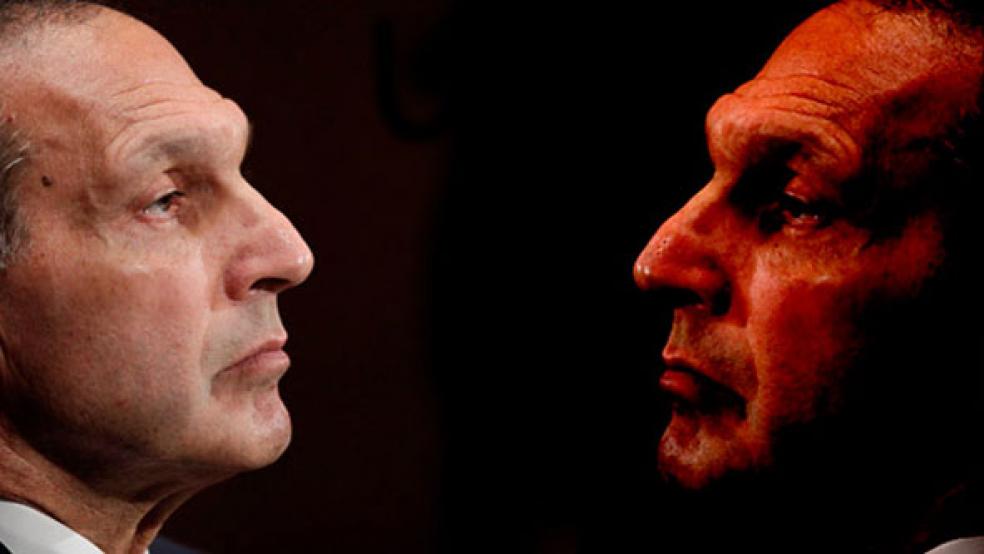It’s been years since Dick Fuld, the CEO who presided over the collapse of Lehman Brothers, has been in the public spotlight or, for that matter, the congressional hot seat. So as Fuld last Thursday gave his first public speech since the crisis of 2008, story after story about the former CEO provided a useful reminder of just who he was: the hard-charging, little-liked Gorilla of Wall Street.
Fuld may have emerged from his years of silence in part because the legal cloud over his head has dissipated with the passage of time — and in part because he’s eyeing a comeback of sorts. His financial advisory firm, Matrix Advisors, has launched a licensed real estate brokerage, USA Today reported. And he reportedly also has a hand in the planned relaunching of the National Stock Exchange slated for later this summer. But Fuld’s speech made clear that, nearly seven years after Lehman filed for bankruptcy, this gorilla is still more likely to thump his chest than to beat his breast in contrition.
From the podium at the Marcum MicroCap Conference in New York, the 69-year-old Fuld reportedly blamed the crisis that left the bank frozen out of the financial world and with no choice but to declare bankruptcy on a “perfect storm” of factors, including government policies that encouraged lower lending standards for homebuyers and mortgage borrowers who tapped into their mounting home equity their homes “as ATM accounts.” Fuld also pointed to the unchecked growth of hedge funds and other investment outlets and to the Federal Reserve’s interest rate moves that stoked the housing boom and then abruptly ended it.
“It’s not just a one single thing, it’s all these things taken together,” he said.
Fuld’s brief analysis stopped there, though. It failed to delve into the role Wall Street or his bank played in the crisis — or his own role in Lehman’s bankruptcy, the largest in U.S. history. Fuld apparently did respond to one question by saying, "You don't have time to hear about all the things I'd have done differently," and said that “there is no if we woulda, coulda, shoulda." But if he has any remorse about the concentrated bets that led to its demise or the actions he could have taken to save the firm, Fuld kept mum.
More than that, he began his remarks by touting the corporate culture that made Lehman Brothers “one of the great investment banks on Wall Street,” including compensation practices that were meant to foster teamwork and a sense of communal ownership. Fuld noted that Lehman employees owned more than 30 percent of the company’s stock. "Regardless of what you heard about Lehman Brothers’ risk management,” he said, “I had 27,000 risk managers because they all owned a piece of the firm."
Clearly, 27,000 risk managers wasn’t enough, as the March 2010 examiner’s report in Lehman’s bankruptcy case made clear:
“In 2006, Lehman made the deliberate decision to embark upon an aggressive growth strategy, to take on significantly greater risk, and to substantially increase leverage on its capital. In 2007, as the sub‐prime residential mortgage business progressed from problem to crisis, Lehman was slow to recognize the developing storm and its spillover effect upon commercial real estate and other business lines. Rather than pull back, Lehman made the conscious decision to ‘double down,’ hoping to profit from a counter‐cyclical strategy. As it did so, Lehman significantly and repeatedly exceeded its own internal risk limits and controls.”
Perhaps Fuld’s 27,000 risk managers missed all this because most of those employees weren’t aware of just how leveraged Lehman was or how concentrated its exposure was in illiquid positions in the commercial real estate and subprime markets. Or perhaps it was because the stock holdings of some investment bankers made them more aggressive about the upside of any bets than worried about the downside. The examiner’s report said that “in practice, Lehman rewarded its employees based upon revenue with minimal attention to risk factors in setting compensation.” It also concluded that “e‐mails written by Lehman risk management personnel suggest that Lehman senior management disregarded its risk managers, its risk policies, and its risk limits.”
In his appearance last week, Fuld said that he thinks about Lehman Brothers every day but he reportedly tossed in the phrase “no regrets” more than once. Before he plots the next step in his comeback, maybe he should think about Lehman some more.
Top Reads from The Fiscal Times:


